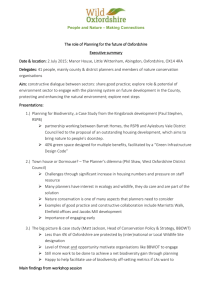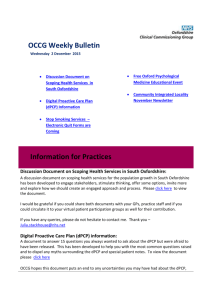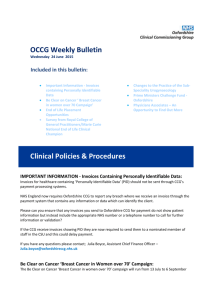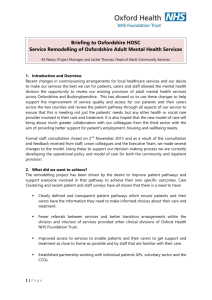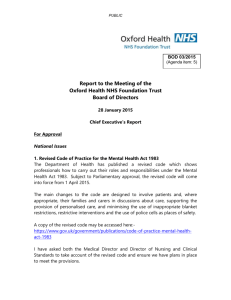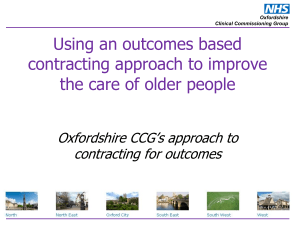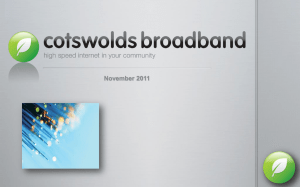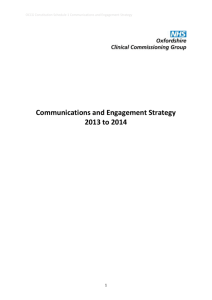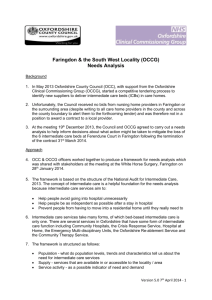North Oxfordshire Locality Patient and Public Forum
advertisement
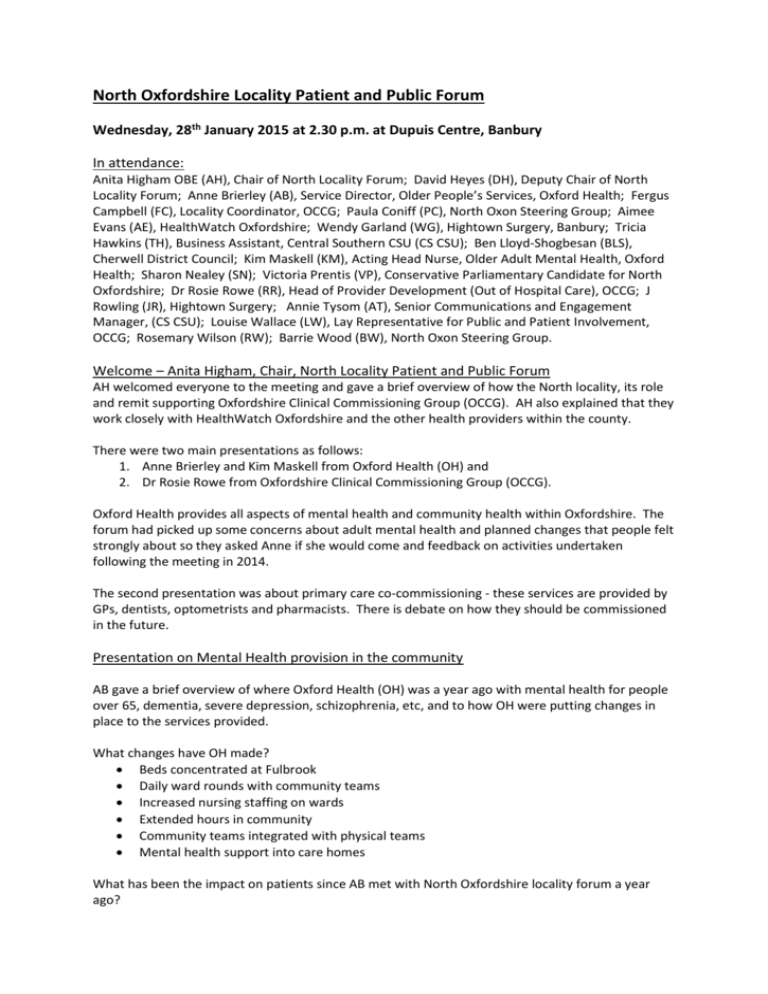
North Oxfordshire Locality Patient and Public Forum Wednesday, 28th January 2015 at 2.30 p.m. at Dupuis Centre, Banbury In attendance: Anita Higham OBE (AH), Chair of North Locality Forum; David Heyes (DH), Deputy Chair of North Locality Forum; Anne Brierley (AB), Service Director, Older People’s Services, Oxford Health; Fergus Campbell (FC), Locality Coordinator, OCCG; Paula Coniff (PC), North Oxon Steering Group; Aimee Evans (AE), HealthWatch Oxfordshire; Wendy Garland (WG), Hightown Surgery, Banbury; Tricia Hawkins (TH), Business Assistant, Central Southern CSU (CS CSU); Ben Lloyd-Shogbesan (BLS), Cherwell District Council; Kim Maskell (KM), Acting Head Nurse, Older Adult Mental Health, Oxford Health; Sharon Nealey (SN); Victoria Prentis (VP), Conservative Parliamentary Candidate for North Oxfordshire; Dr Rosie Rowe (RR), Head of Provider Development (Out of Hospital Care), OCCG; J Rowling (JR), Hightown Surgery; Annie Tysom (AT), Senior Communications and Engagement Manager, (CS CSU); Louise Wallace (LW), Lay Representative for Public and Patient Involvement, OCCG; Rosemary Wilson (RW); Barrie Wood (BW), North Oxon Steering Group. Welcome – Anita Higham, Chair, North Locality Patient and Public Forum AH welcomed everyone to the meeting and gave a brief overview of how the North locality, its role and remit supporting Oxfordshire Clinical Commissioning Group (OCCG). AH also explained that they work closely with HealthWatch Oxfordshire and the other health providers within the county. There were two main presentations as follows: 1. Anne Brierley and Kim Maskell from Oxford Health (OH) and 2. Dr Rosie Rowe from Oxfordshire Clinical Commissioning Group (OCCG). Oxford Health provides all aspects of mental health and community health within Oxfordshire. The forum had picked up some concerns about adult mental health and planned changes that people felt strongly about so they asked Anne if she would come and feedback on activities undertaken following the meeting in 2014. The second presentation was about primary care co-commissioning - these services are provided by GPs, dentists, optometrists and pharmacists. There is debate on how they should be commissioned in the future. Presentation on Mental Health provision in the community AB gave a brief overview of where Oxford Health (OH) was a year ago with mental health for people over 65, dementia, severe depression, schizophrenia, etc, and to how OH were putting changes in place to the services provided. What changes have OH made? Beds concentrated at Fulbrook Daily ward rounds with community teams Increased nursing staffing on wards Extended hours in community Community teams integrated with physical teams Mental health support into care homes What has been the impact on patients since AB met with North Oxfordshire locality forum a year ago? Bed capacity and extra contractual referrals (ECRs) Inpatient admissions for north locality patients Patients supported at home Carers supported to travel from north of county to Fulbrook to visit patients During the winter pressures – late September – OAMH team were ready for it and have not sent patients out of county for care since September. What would this mean to in-patient admissions? AB stated that since July they have admitted 5 North Oxfordshire patients to the Fulbrook Centre, which is lower than previously, and are supporting two or three people intensively within their own homes. What does that mean for families travelling to the Fulbrook Centre? There has been one lady that has needed help to get there – she has had a taxi paid for her twice a week – also, nurses have given her a lift there and back too. The numbers are very small, however, impact on them to stay in touch has been really important. DH stated that there was a long delay between seeing a GP and getting treatment – was it still a problem? Community teams, in an emergency, would reach a patient within 4 hours. Oxford Health would respond by phone within 20 minutes. Clarity was requested on community teams - if you are admitting fewer patients, that means there are more at home and could put pressure on carers. Can I contact the adult team as a carer if I am struggling? AB responded that we are looking into integration so that you can come straight to the team for information and advice. In Chipping Norton the clinics are always full. Part of discussion with OCCG is that we need to diagnose people in the planned clinics. There is a team but we need to make sure we have enough staff to deal with the relevant problems. Trying to examine what clinical capacity will meet patient need. What is OH going to do next? Recovery of model of care Clusters for older adult mental health (OAMH) treatments Joint mental health and physical health inpatient model of care at the Fulbrook Centre Presentation on Co-commissioning RR introduced what her current role is as Head of Provider Development – working with GPs in how they could work differently and working on co-commissioning. What is primary care co-commissioning? Primary care co-commissioning is about joining up the commissioning arrangements between NHS England and the CCG in order to: Co-ordinate focused support for primary care Deliver local priorities better Reduce system barriers and inefficiencies Put clinicians at the heart of commissioning primary care Increase the quality of primary care commissioning Improve patient experience GPs are currently commissioned by NHS England. Pharmacy, ophthalmology and dentistry are also services commissioned by NHS England’s Local Area Team (which is Thames Valley) and our Public Health specialists are now within Oxfordshire County Council. Clinical Commissioning Groups have a responsibility to oversee the health system in their area and by gaining influence in primary care commissioning, we will be in a stronger position to support system-wide developments. CCGs were asked for their thoughts on whether to co-commission primary care with the Area Team. The benefits of CCGs being involved is that clinicians know what their patients’ needs are. Back in November OCCG was asked by NHS England to select a model of co-commissioning of primary care, that they would prefer to take on. They were given 3 options to choose from. Option 1 – Involves regular communications about commissioning plans for general practice. This is currently happening in Oxfordshire as we have strong partnership relationships. Option 2 – To work jointly to develop primary care, however NHS England’s Area Team will retain the day-to-day management of core primary care services and the subsequent financial responsibilities. Option 3 – To enter into fully delegated commissioning with CCGs carrying out primary care commissioning rather than NHS England’s Area Teams. This offers significant opportunities to influence primary care locally, however this is not an activity CCGs have previously undertaken and the additional responsibility does not come with additional resources to support it. These options have to be looked at within our budget envelope. We sought views from our membership organisation – model one is already being done and model three represents significant change, while model two gives the opportunity to progress carefully. The OCCG Executives agree that joint commissioning represents a sensible approach and there will be a vote for it at the next Governing Body meeting. RR asked if she could come back again to talk further on other developments. Question and answer session A question was raised about GP federations forming in Oxfordshire. Response: In Oxfordshire we have seven federations covering Oxfordshire - this means that GP practices are going to work collaboratively. The purpose is to achieve economies of scale and offer a wider variety of services. A question was raised about the Out of Hours service and whether a representative can come to talk to NOLF? Action: FC to look into this. Patient and Public Involvement Update At the recent NOLF Steering Group meeting (20 January), the group decided to focus on three particular issues for the next public event and ask each of the 13 PPGs in North Oxfordshire in the interim, for their feedback on these issues. The three issues are; integration and multi-disciplinary teams; GP federations and Out of Hour GP services. We will gather the feedback and questions posed and invite a relevant panel to the next NOLF public forum to respond to the feedback from PPG members. The details of the next public event are being confirmed and will be circulated on email via practice managers. FC stated that the CCG has been listening, but what we’ve failed to do is feedback consistently what we’ve listened to and inform on what has changed. The grid presented (hand-out) is a start (it currently contains abbreviations which will be amended). FC discussed the items on the grid and highlighted progress made. Patient delays and difficulties – need to come back and feedback. Not solved yet, but work has been done. OCCG is aware there are out-patient appointments that have been delayed in ENT and ophthalmology. Colleagues have been raising these issues with the trust and changes are being implemented. The other big area is a review of MSK and ENT services. These reviews are underway and have advertised for patient representatives. We will provide updates at relevant intervals to keep you informed of progress. Reflections on the discussions - David Heyes, Vice Chair, North Locality Forum Our record public turnout was a meeting in Chipping Norton in 2014. We are working to improve our public involvement and our role in feeding back to the OCCG from members. When we ran a meeting on elderly mental health and dementia we managed to get a good response, however, our subsequent meeting was poorly attended with more health professionals than members of the public. Meetings are run; we write reports to commissioners, which then disappear into a black hole. It is nice to see that AB has been listening and refreshing that they are acting on our feedback. AH thanked everyone for their time and hoped we will all meet again soon.
